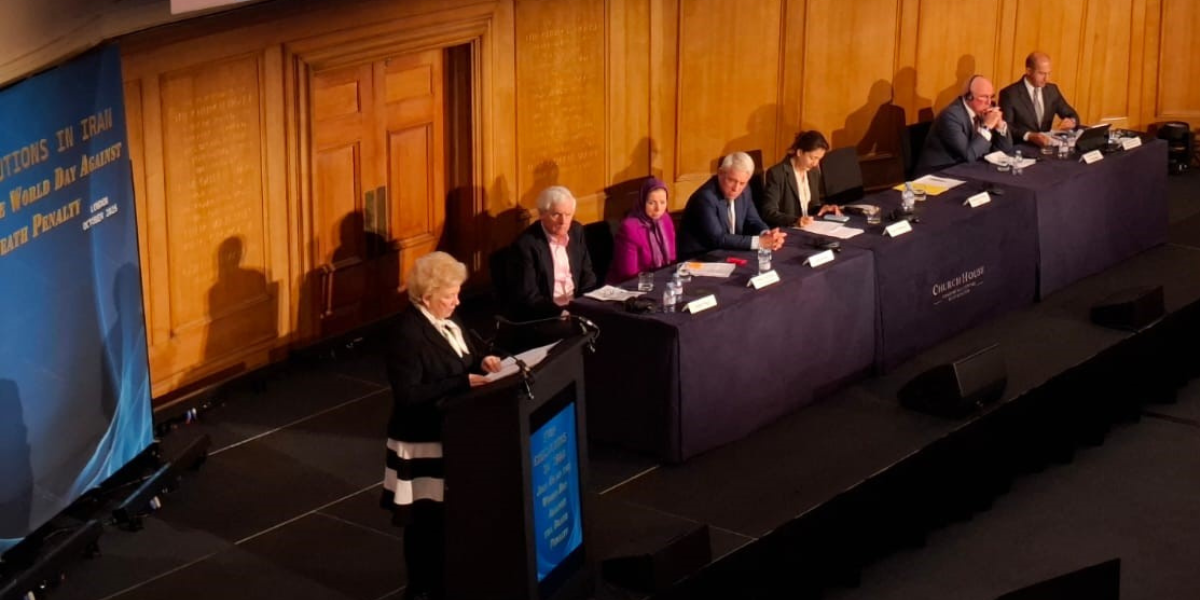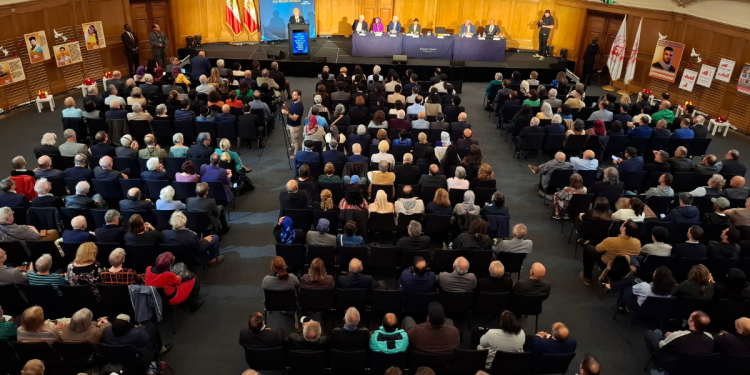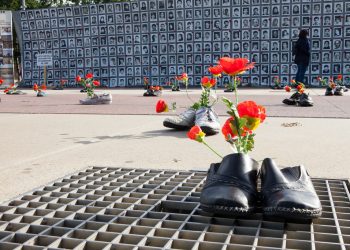On October 11, 2025, Iran Human Rights Monitor (Iran HRM) co-sponsored an urgent international conference in London at Church House, Westminster. The event brought together parliamentarians, human rights defenders, former political prisoners, and global advocates to address the escalating crisis of executions and human rights violations in Iran. Convened on the occasion of the World Day Against the Death Penalty, the conference focused on the plight of 17 political prisoners affiliated with the People’s Mojahedin Organization of Iran (PMOI/MEK) who face imminent execution, and on the broader campaign for justice and the abolition of the death penalty in Iran.
Speakers
- Baroness Nuala O’Loan, DBE MRIA, member of the UK House of Lords
- Ingrid Betancourt, former Colombian presidential candidate and hostage survivor
- Rt Hon. Theresa Villiers, former UK Cabinet Minister and Member of Parliament
- Maryam Rajavi, President-elect of the National Council of Resistance of Iran (NCRI)
- John Bercow, former Speaker of the UK House of Commons
- Javaid Rehman, UN Special Rapporteur on the situation of human rights in Iran
- Giulio Terzi, former Italian Foreign Minister
- Representatives of the Iranian community and former political prisoners
- Other international dignitaries, politicians, NGOs, and activists
 Baroness O’Loan delivered a comprehensive summary of the current crisis, announcing a statement condemning executions and human rights abuses in Iran, signed by over 500 international dignitaries, politicians, NGOs, and activists. She highlighted the alarming statistic that one person is executed every 3.5 hours in Iran. “The regime’s brutality is a deliberate strategy to terrorize a restless population demanding democratic change,” she stated.
Baroness O’Loan delivered a comprehensive summary of the current crisis, announcing a statement condemning executions and human rights abuses in Iran, signed by over 500 international dignitaries, politicians, NGOs, and activists. She highlighted the alarming statistic that one person is executed every 3.5 hours in Iran. “The regime’s brutality is a deliberate strategy to terrorize a restless population demanding democratic change,” she stated.
Baroness O’Loan called on the UK government to refer Iran’s record to the UN Security Council for prosecution at the International Criminal Court, to impose targeted sanctions on Supreme Leader Ali Khamenei and senior officials, and to apply universal jurisdiction to prosecute perpetrators of crimes against humanity.
Baroness O’Loan highlights the demands of over 500 dignitaries in their statement:
No to executions. No to impunity for the perpetrators of the 1988 massacre.
She calls for urgent action to save lives, asking: Why are these executions happening? Why now? And what must be done?… pic.twitter.com/g1wyYAKOLC— IRAN HRM (@IranHrm) October 11, 2025
Ingrid Betancourt paid tribute to the courage of Iranian political prisoners, highlighting the “No to Execution Tuesdays” campaign, in which prisoners have refused food every Tuesday for 20 consecutive months to protest executions. “These prisoners have turned hunger into a weapon to accuse their executioners. They have transformed a day of horror into a time for resistance, dignity, solidarity, and above all, hope,” she said. Betancourt condemned the death penalty as “an inhumane, uncivilized, and barbaric political weapon wielded to instill fear and suppress dissent.”
Every day is #WorldDayAgainstTheDeathPenalty for the #NoToExecutionTuesdays campaign.@IBetancourtCol: Iran’s prisoners turn hunger into a weapon, pointing to and accusing their executioners. They transform a day of horror into a moment of resistance, dignity, solidarity, and… pic.twitter.com/3NAlMiqPJ5
— IRAN HRM (@IranHrm) October 11, 2025
Rt Hon. Theresa Villiers, former UK Cabinet Minister, reiterated the UK Parliament’s concern over the surge in executions and urged the British government to take a principled stand. “There can be no business as usual with a regime that executes its own citizens for demanding freedom,” she declared, underscoring the importance of aligning UK foreign policy with human rights values.
Rt Hon Theresa Villiers urged @UKGov to take concrete steps to end impunity by referring Iran’s atrocious human rights record to the @UN Security Council.
She called for a tribunal to prosecute perpetrators, targeted sanctions on the Supreme Leader and all responsible officials,… pic.twitter.com/cDpGH4d6v3— IRAN HRM (@IranHrm) October 11, 2025
Maryam Rajavi, President-elect of the NCRI, denounced the regime as “a monster of death and a symbol of destruction.” She called for a fundamental shift in international policy: “Stop auctioning off the human rights of our oppressed compatriots. End the practice of sacrificing those rights for a nuclear deal and stop bartering away justice in return for the regime’s warmongering and terrorism.” Rajavi urged all nations to condition their relations with Iran on an immediate halt to executions.
Javaid Rehman, the former UN Special Rapporteur on the situation of human rights in Iran, in a video message to the conference condemned the lack of due process and arbitrary executions, calling on the international community to intensify monitoring and accountability efforts.
“States must also use universal jurisdiction to investigate and prosecute individuals for atrocity crimes committed during the 1980s, particularly the 1988 massacre, and for ongoing crimes and forced disappearances,” he stated.
“The United Nations General Assembly, in its annual resolution on Iran, should include specific references to the 1988 massacre and the continuation of atrocity crimes, including murder, torture, and enforced disappearances of political prisoners as witnessed today. Unless prevented by the international community, the regime’s intention is to repeat the atrocity crimes committed against the Iranian people in 1988.”
Addressing the conference via video message, Senator Giulio Terzi, former Italian Foreign Minister, emphasized the need for coordinated European action, including targeted sanctions and international investigations, to end impunity for human-rights violators in Iran. He warned that Iran is among the world’s most prolific executioners, responsible for a disproportionate share of global executions.
John Bercow, former Speaker of the UK Parliament, strongly condemned Iran’s authorities for what he described as operating a “fascist state” responsible for nearly two-thirds of all executions worldwide. He drew attention to recent cases, including the executions of PMOI supporters Behrouz Ehsani and Mehdi Hassani, and the death of political prisoner Somayeh Rashidi, who was denied medical treatment while in custody.
He urged the UK government to place Iran’s human rights violations at the center of its foreign policy, emphasizing that “the flame of freedom can be dimmed, but it cannot be extinguished.”
Several NGOs and delegation of Iranian activists shared testimonies on the harrowing realities of repression and executions inside Iran. They presented evidence of the regime’s systematic destruction of mass graves and concealment of atrocities, reinforcing the call for transparent investigations and justice for victims’ families.
Massoud Zabeti, president of the Anglo Iranian Lawyers Association, declared that “the time for appeasement has ended.” Citing a statement signed by 35 transatlantic dignitaries, he noted, “They know what the regime fears most — the PMOI’s strength and the vast support it commands inside Iran.” Zabeti warned that Tehran continues to export “death and terror” beyond its borders to Iraq, Syria, Lebanon, and even Europe. Addressing the regime directly, he stated, “Your time is up. Iran will face a new dawn, and those responsible for these crimes will face justice.”
Rosa Zarei, a young Iranian British academic, opened the session by honoring her father, a former political prisoner, and her aunt, executed in 1988. “We are here to raise our voices for a future free from state sanctioned killings.,” she said, reminding attendees that “Iran has the highest rate of executions per capita in the world.”
Azadeh Hosseini, a teacher from London, spoke of how her uncles and aunt were executed under both the Shah’s dictatorship and the current regime. “They were imprisoned and tortured first by the Shah, then executed by the mullahs,” she recalled, affirming the people’s rejection of both forms of tyranny: “Today, I join to say no to execution and yes to freedom. The death penalty is not a tool of justice. It is the regime’s weapon of fear and oppression. Yet fear and oppression cannot stop the truth.”
Neda Zabeti, a 20-year-old law student, shared that five of her relatives had been executed. “Having five family members murdered should shock you,” she said, “but for Iranians, this has become normal — and it should never be.”
“We cannot sit by and watch another woman executed, another child executed, another child tortured beyond the point of recognition. We cannot have another activist silenced, murdered. Even Iranian people with nothing left to lose are sitting in prisons, refusing food every Tuesday, in protest of executions and the death penalty.”
She condemned the regime’s politicized trials and urged Western governments to “end their silence.”
Omid Ebrahimi, a young doctor whose family members were killed in the 1988 massacre, said, “I speak as part of a generation that refused and refuses to stay silent in the face of tyranny. Across Iran, young men and women, students, workers, and professionals are risking everything to keep the flame of resistance alive.” “Supporting the youth and their right to resist,” he said, “is not only a moral duty; it is essential for peace and democracy.”
Rana Rahmanfard, a linguistics graduate, recalled her uncle Nader, executed for supporting the PMOI, and called the international community for concrete measures. “We say that words of condemnations and sanctions against individuals no longer serve a purpose. Your words alone mean nothing if your actions fail you.”
The conference concluded with a strong consensus on immediate action, as set out in the statement signed by over 500 personalities. Key demands included:
- Immediate halt to the execution of political prisoners, especially the 17 at imminent risk
- Referral of Iran’s human-rights file to the UN Security Council and the International Criminal Court
- Imposition of targeted sanctions on regime leaders and officials responsible for human-rights abuses
- Application of universal jurisdiction to prosecute perpetrators of crimes against humanity
- Recognition of the NCRI’s 10-point democratic platform, with abolition of the death penalty as a central pillar for a free Iran
- Access for international fact-finding missions and independent observers to prisons and trial proceedings
Iran HRM, as a dedicated human rights research NGO, reaffirms its commitment to documenting abuses, advocating for victims, and collaborating with partners such as the NCRI to end the execution crisis and secure justice for the people of Iran. The conference’s unified message was clear: now is the time for global action to defend human rights and abolish the death penalty in Iran.







